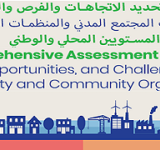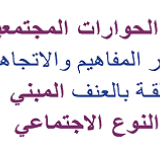2018 Civil Society Organization Sustainability Index for the Middle East and North Africa
The CSO Sustainability Index for the Middle East and North Africa evaluates the strength and viability of the CSO sectors in Egypt,Iraq,Jordan,Lebanon,Libya,Morocco,and Yemen. This edition of the Index covers events and trends affecting CSOs in 218. It is the first edition to include a report on Libya.
CSOs in the Middle East and North Africa faced a range of external challenges in 218. Across much of the region,organizations operated under challenging economic conditions that both impeded their work and created new demands for their services and advocacy. In Yemen,85 percent of the population subsisted below the poverty line—many on the brink of famine; local CSOs struggled to meet the overwhelming needs for humanitarian aid and assistance as inflation drove up the price of basic goods and services. In Egypt,austerity measures depressed the value of the Egyptian Pound and increased the cost of necessities,making it more difficult for CSOs to pay their staff and cover the costs of their activities. Jordan’s economy continued to struggle under growing public debt,a 19 percent unemployment rate,and rising costs of bread and fuel; these hardships coincided with reduced local donations to CSOs. A new income tax law that would have raised taxes for most people sparked major protests in Jordan that CSOs helped to organize and participated in.
The Index’s methodology relies on CSO practitioners and researchers,who in each country form an expert panel to assess and rate these dimensions of CSO sustainability during the year. The panel agrees on a score for each dimension,which ranges from 1 (the most enhanced level of sustainability) to 7 (the most impeded). The dimension scores are then averaged to produce an overall sustainability score for the CSO sector of a given country. An editorial committee composed of technical and regional experts reviews each panel’s scores and the corresponding narrative reports,with the aim of maintaining consistent approaches and standards to facilitate cross-country comparisons as well as assessments of trends over time.
The Index is a useful source of information for local CSOs,governments,donors,academics,and others who want to better understand and monitor key aspects of sustainability in the CSO sector.


